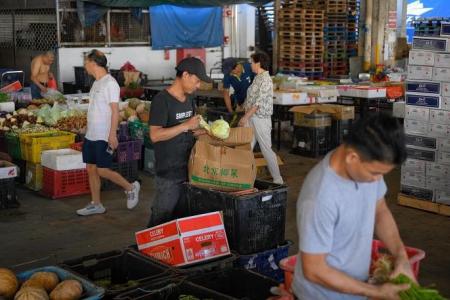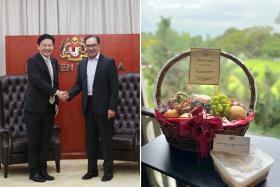Wholesale Centre vendors worry new registration system will affect footfall
Visitors will soon have to register before entering the Pasir Panjang Wholesale Centre, with the implementation of a new system which vendors worry will result in a drop in footfall.
Under the new system, visitors will be required to register their visit online or via a kiosk at the compound’s guard house. They will also have to scan their identification documents before entering or exiting the premises, said the Singapore Food Agency (SFA).
The system will kick in on March 1. Currently, visitors and vendors are not required to register nor scan their IDs when visiting the wholesale centre.
The new system is meant to enhance safety and security in the premises and “ensure future pandemic preparedness”, learning from the Covid-19 pandemic when traceability was an important way to mitigate the spread of the virus, SFA added.
The agency said it will implement the system gradually “to give users time to adapt”, but did not elaborate when asked about the stages of implementation.
Vendors told The Straits Times that they did not know how the system would work, and were worried it would compromise business and the efficiency of their operations.
Ms Prim Tina, manager at organic produce wholesaler Zenxin Organic, said the system would likely pose an inconvenience for customers.
She added: “Our location is already remote, the system just gives customers another reason to not visit and we will be losing a lot of business.
“Workers should have a pass for identification, so we don’t have to use the system one by one everyday. There will be a lot of time wasted standing and queueing at the entrance,” she added.
Ms Tina said she thinks the system is unnecessary as there are existing security measures, such as regular checks by security guards.
Ms Lilian Loh, who works at fruits and vegetables distributor Freshmart, said in Mandarin: “The economy is already on a downturn, and this will cause our business to decrease even more.”
Walk-in customers might opt to visit other markets to avoid the extra trouble of registration, she added.
She is also worried the system will decrease efficiency in operations, as large vehicles delivering goods might be caught in a jam at the entrance of the centre.
“If everyone in each vehicle has to register, there will be a huge delay,” she said. There are three car park gantries at the entrance of the centre.
It is unclear if there will be a different arrangement for tenants and delivery personnel, said vendors, who received a circular on the implementation in January.
The circular, which is also pinned on bulletin boards around the centre, informed them of slated renovation works in the centre to install the system.
When ST visited the wholesale centre on Feb 20, two digital kiosks and two turnstiles had been set up beside the guard house.
The centre occupies about 15.2 hectares of land, according to the SFA website, and houses more than 330 cold storage units and about 600 shops and stalls.
Regular visitors also said the new system would pose a hassle.
The founder of volunteer organisation Fridge Restock Community, Mr Daniel Yap, visits the centre twice a week with a team of about 20 to collect produce. The team later distributes the food to community fridges or points in various neighbourhoods.
Mr Yap, 47, said the centre should remain “an open area for people to enter freely to make purchases”. He added that the system might be hard for visitors, especially elderly, to navigate.
Homemaker Sharon Wu visits the wholesale centre about once a month, as produce is fresher there and about 20 per cent cheaper than those sold in wet markets and supermarkets.
“If buying groceries here will take a much longer time, I might go to other markets such as the one at Ghim Moh instead,” added Ms Wu, 50.
But security experts emphasised the importance of such systems at wholesale food centres, which are key distribution points for Singapore’s food supply chain.
According to SFA statistics, Singapore imports more than 90 per cent of its food supply.
A spokesperson from security company Certis said the system “is an effective way to enhance security and safety” and will better support contact tracing and enforcement efforts in the event of future emergencies and pandemics.
“All well-designed visitor management systems must strike a good balance between security and the daily operational needs of the facilities and their users,” added the spokesperson.
Senior security consultant Soe Chin Hua said the system, if implemented and managed well, would secure the premises while making it unattractive as a terrorist target.
It can serve many other purposes too, such as aiding fire evacuation and supporting data analytics to understand personnel and vehicle movement, which can be used to better manage the flow and security of manpower, he said.
A similar system will be implemented at the Jurong Fishery Port on the same date, said SFA. The Senoko Fishery Port, the other port under the agency’s purview, will be shutting down at the end of March 2024.
Jurong Fishery Port visitors are currently required to fill in their particulars at the guard house in exchange for physical visitor passes.
As the facility is an international port where foreign vessels dock, there is a risk of contrabands, controlled drugs, and weapons being smuggled into or out from Singapore, said executive director of security company JK Consultancy Holdings Joshua Kwai.
Maintaining high levels of safety and security at both the port and wholesale centre are “paramount”, he added.
Get The New Paper on your phone with the free TNP app. Download from the Apple App Store or Google Play Store now


